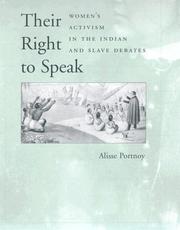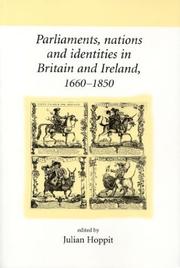| Listing 1 - 9 of 9 |
Sort by
|
Book
ISBN: 9782753565104 2753565104 2753588716 Year: 2022 Publisher: Rennes : Presses universitaires de Rennes,
Abstract | Keywords | Export | Availability | Bookmark
 Loading...
Loading...Choose an application
- Reference Manager
- EndNote
- RefWorks (Direct export to RefWorks)
Revitalisée par l’Internet et l’effervescence des réseaux issus des sociétés civiles, la pétition connaît une nouvelle vogue comme mode d’action auprès des pouvoirs en place en Europe et dans le monde. Cette renaissance suit des décennies d’effacement apparent, après un xixe siècle que l’on a pu caractériser comme essentiellement pétitionnaire. C’est notamment le cas pour la France et son voisin britannique : entre 1814 et 1848, plus de 40 000 pétitions sont adressées à la Chambre des députés, quand dix fois plus sont présentées à la Chambre des communes. Entre deux royaumes qui présentent alors plus d’une analogie, le contraste est saisissant. Une des clés de ce fossé ne se trouve-t-elle pas dans la place et le rôle que chacun des acteurs de la vie politique accorde à la pétition des deux côtés de la Manche ? L’enjeu est ici celui des médiations et des liens entre société, corps intermédiaires et pouvoirs, d’une part, citoyens actifs, passifs et élites dirigeantes, d’autre part. À travers la mise en œuvre d’une approche globale, transversale et surtout comparative des configurations politiques françaises et britanniques du premier xixe siècle, essentiellement fondée sur l’exploitation qualitative et quantitative de sources originales, ce livre met en perspective les dimensions multiples du phénomène pétitionnaire. En ce sens, il permet de décloisonner les dynamiques politiques nationales classiques et de redéfinir les modèles reçus de rapports entre société civile et État, par-delà les proximités, rapprochements, tensions et autres « Brexit » qui rassemblent autant qu’ils séparent deux voisins proches et différents.
Political participation --- Petitions --- France --- Great Britain --- History --- Histoire contemporaine --- Politique --- Sciences humaines et sociales
Book
ISBN: 9781498534536 1498534538 Year: 2016 Publisher: Lanham, [Maryland] : Lexington Books,
Abstract | Keywords | Export | Availability | Bookmark
 Loading...
Loading...Choose an application
- Reference Manager
- EndNote
- RefWorks (Direct export to RefWorks)
This book examines the positive effects of the petition system on China's resilient decentralized authoritarian regime. Combining detailed case studies and rigorous statistical analysis, it argues that citizens' petitions help the regime to alleviate threats to stability by giving an information edge to the Chinese central government.
Decentralization in government --- Petitions --- Administrative agencies --- Authoritarianism --- China --- Politics and government.
Book
ISBN: 0822986590 9780822986591 0822945509 Year: 2019 Publisher: Pittsburgh, Pennsylvania : University of Pittsburgh Press,
Abstract | Keywords | Export | Availability | Bookmark
 Loading...
Loading...Choose an application
- Reference Manager
- EndNote
- RefWorks (Direct export to RefWorks)
Morelia (Michoacán de Ocampo, Mexico) --- Michoacán (Mexico) --- Nueva Ciudad de Mechoacán (Mexico) --- Politics and government. --- Petitions --- History. --- Social pressure
Book
ISBN: 150363227X 1503632261 Year: 2022 Publisher: Stanford, CA : Stanford University Press,
Abstract | Keywords | Export | Availability | Bookmark
 Loading...
Loading...Choose an application
- Reference Manager
- EndNote
- RefWorks (Direct export to RefWorks)
Tens of thousands of Palestinians migrated to the Americas in the final decades of the nineteenth century and early decades of the twentieth. By 1936, an estimated 40,000 Palestinians lived outside geographic Palestine. Transnational Palestine is the first book to explore the history of Palestinian immigration to Latin America, the struggles Palestinian migrants faced to secure Palestinian citizenship in the interwar period, and the ways in which these challenges contributed to the formation of a Palestinian diaspora and to the emergence of Palestinian national consciousness. Nadim Bawalsa considers the migrants' strategies for economic success in the diaspora, for preserving their heritage, and for resisting British mandate legislation, including citizenship rejections meted out to thousands of Palestinian migrants. They did this in newspapers, social and cultural clubs and associations, political organizations and committees, and in hundreds of petitions and pleas delivered to local and international governing bodies demanding justice for Palestinian migrants barred from Palestinian citizenship. As this book shows, Palestinian political consciousness developed as a thoroughly transnational process in the first half of the twentieth century—and the first articulation of a Palestinian right of return emerged well before 1948.
Citizenship --- Palestinian Arabs --- Transnationalism --- History --- Ethnic identity --- Legal status, laws, etc. --- Politics and government --- Political aspects --- British Mandate. --- Citizenship. --- Diaspora. --- Latin America. --- Migration. --- Ottoman Empire. --- Palestine. --- Periodicals. --- Petitions. --- Right of Return.
Book
ISBN: 1925523861 1925495647 1925495655 1925495639 Year: 2017 Publisher: Clayton, Victoria, Australia : Monash University Publishing,
Abstract | Keywords | Export | Availability | Bookmark
 Loading...
Loading...Choose an application
- Reference Manager
- EndNote
- RefWorks (Direct export to RefWorks)
Exiles, lost souls, remnants of a dying race ... The fate of the First Nations peoples of Van Diemens Land is one of the most infamous chapters in Australian history. The men, women and children exiled to Flinders Island in the 1830s and 40s have often been written about, but never allowed to speak for themselves. This book aims to change that. Documents penned by the exiles during their 15 years at the settlement Wybalenna offer a compelling counter-narrative to traditional representations of a hopeless, dispossessed, illiterate people's final days. The exiles did not see themselves as prisoners, but as a Free People. Seen through their own writing, the community at Wybalenna was vibrant, complex and evolving. Rather than a depressed people simply waiting for death, their own words reveal a politically astute community engaged in a 15 year campaign for their own freedom. This book tells a compelling story that will profoundly affect understandings of Tasmanian and Australian history.
Aboriginal Australians --- Aboriginals, Australian --- Aborigines, Australian --- Australian aboriginal people --- Australian aboriginals --- Australian aborigines --- Australians, Aboriginal --- Australians, Native (Aboriginal Australians) --- Native Australians (Aboriginal Australians) --- Ethnology --- Indigenous peoples --- Social conditions. --- History --- Australian history --- Australian Aborigines --- Tasmania --- Wybalenna --- colonialism --- Aboriginal history --- Tasmanian history --- Flinders Island (Tas.) --- History. --- Exiles --- Correspondence. --- Politics and Government - Political action - Petitions. --- Settlement and contacts - Government settlements, reserves. --- Wybalenna (Flinders Island Tas SK55-02).

ISBN: 0674019229 0674042220 9780674042223 9780674019225 Year: 2009 Publisher: Cambridge, MA
Abstract | Keywords | Export | Availability | Bookmark
 Loading...
Loading...Choose an application
- Reference Manager
- EndNote
- RefWorks (Direct export to RefWorks)
In this groundbreaking study, Portnoy links antebellum Indian removal debates with crucial, simultaneous debates about African Americans--abolition of slavery and African colonization--revealing ways European American women negotiated prohibitions to make their voices heard. Situating the debates within contemporary, competing ideas about race, religion, and nation, Portnoy examines the means by which women argued for a "right to speak" on national policy.
Women political activists --- Political participation --- Women abolitionists --- Antislavery movements --- Indians of North America --- Indians, Treatment of --- Petitions --- History --- Relocation. --- Public opinion --- Citizen participation --- Community action --- Community involvement --- Community participation --- Involvement, Community --- Mass political behavior --- Participation, Citizen --- Participation, Community --- Participation, Political --- Political activity --- Political behavior --- Social pressure --- Indians --- Abolitionists --- Women social reformers --- Political activists --- Political rights --- Social participation --- Politics, Practical --- Government relations --- United States --- 19th century --- Relocation --- Indians [Treatment of ] --- Petitory actions
Book
ISBN: 3030985334 3030985342 Year: 2022 Publisher: Cham : Springer International Publishing : Imprint: Palgrave Macmillan,
Abstract | Keywords | Export | Availability | Bookmark
 Loading...
Loading...Choose an application
- Reference Manager
- EndNote
- RefWorks (Direct export to RefWorks)
“The sheer breadth of historical work here is astounding, encompassing Senegal to indigenous North America (including Florida) to South America and Europe. Neither scholars nor students of the petition will be able to understand its life-force without reference to this remarkable collection.” —Daniel Carpenter, Allie S. Freed Professor of Government, Harvard University “This remarkable volume fully demonstrates the fundamental role played by petitions in a crucial chronology: the final phase of European empires in the Americas and the emergence of the first Liberal regimes.” —Pedro Cardim, Universidade Nova de Lisboa “This book makes a valuable contribution to our understanding of how petitioning shaped political and social relations across the Atlantic world. It expands historical scholarship by illuminating this important dynamic in a wide range of imperial and colonial polities, stretching across the conventional late eighteenth-century divide.” —Brodie Waddell, Birkbeck, University of London “This book deals with one of the most pervasive ways by which people have addressed authority throughout history: petitioning. Based on a Congress held at the Instituto de Ciências Sociais da Universidade de Lisboa (Petitions in the Age of the Atlantic Revolutions), in February of 2019, the book explores traditional practices and institutions, as well as the transformation of petitions as vehicles of popular politics. The ability or the right to petition was also a crucial element for the development and operation of early modern empires, playing a major role on the negotiated patterns of the Atlantic World. This book shows how petitions were used in Europe, America and Africa, by the governors and the governed, by the rich and the poor, by the colonists and the colonised and by the liberal and the reactionary groups. Broken down into three thematic parts, encompassing both in chronological and geographical scope, the book deepens our understanding of petitioning and its relation with ideas of consent and subjecthood, nationality and citizenship, political participation and democracy. This book provides a rare comparative platform for the study of a subject that has been receiving growing interest.” Miguel Dantas da Cruz is an assistant researcher at Instituto de Ciências Sociais da Universidade de Lisboa, Portugal.
Petition, Right of --- Petitions --- History. --- Social pressure --- Right of petition --- Political rights --- World history. --- World politics. --- Law—History. --- Imperialism. --- Europe—History—1492-. --- America—History. --- World History, Global and Transnational History. --- Political History. --- Legal History. --- Imperialism and Colonialism. --- History of Early Modern Europe. --- History of the Americas. --- Colonialism --- Empires --- Expansion (United States politics) --- Neocolonialism --- Political science --- Anti-imperialist movements --- Caesarism --- Chauvinism and jingoism --- Militarism --- Global politics --- International politics --- Political history --- World history --- Eastern question --- Geopolitics --- International organization --- International relations --- Universal history --- History

ISBN: 1417590416 9781417590414 9781847790514 1847790518 6610734232 9786610734238 128073423X 9781280734236 0719062462 9780719062469 0719062470 9780719062476 Year: 2003 Publisher: Manchester New York New York Manchester University Press Distributed exclusively in the USA by Palgrave
Abstract | Keywords | Export | Availability | Bookmark
 Loading...
Loading...Choose an application
- Reference Manager
- EndNote
- RefWorks (Direct export to RefWorks)
In 1660 the four nations of the British Isles were governed by one imperial crown but by three parliaments. The abolition of the Scottish and Irish Parliaments in 1707 and 1800 created a United Kingdom of Great Britain and Ireland centred upon the Westminster legislature. What did the making of the monolith mean for the four nations? Did conceptions of English, Irish, Scottish and Welsh identities flourish, change or wither as a consequence to the growth of the imperial Parliament and to what extent did Parliament help or hinder a developing sense of Britishness as a new nationality? The groundbreaking essays in this volume, all based on extensive original research, address these questions from an unusually wide variety of perspectives, showing how the parliaments at Dublin, Edinburgh and, especially, Westminster, were seen and used in very different ways by people from very different communities. Parliament may have been conceived as a repository of 'the' national interest, but in practice it was the site of four national and multiple cross-national identities. This fascinating book is a major contribution to the history of the forging of the United Kingdom and national identity and will be essential reading for all undergraduates of history and politics.
Politics and government --- National characteristics, British. --- Legislative bodies. --- HISTORY --- European history. --- Regional and national history. --- History. --- Humanities. --- Legislative bodies --- British national characteristics --- Bicameralism --- Legislatures --- Parliaments --- Unicameral legislatures --- Constitutional law --- Estates (Social orders) --- Representative government and representation --- Learning and scholarship --- Classical education --- Annals --- Auxiliary sciences of history --- General. --- Ireland. --- Great Britain. --- Europe --- Ireland --- Great Britain --- Council of Europe countries --- Eastern Hemisphere --- Eurasia --- Irish Free State --- House of Commons (Great Britain) --- England and Wales. --- British Empire. --- British Isles. --- Irish Parliament. --- Liverpool petitions. --- Scottish Parliament. --- United Kingdom of Great Britain. --- Westminster legislature. --- geo-political communities. --- imperial identity. --- national identity. --- old Corruption. --- policy debate. --- unions. --- virtual representation.

ISBN: 1597347752 1282357964 9786612357961 0520938348 1417584955 9780520938342 9781597347754 9781417584956 0520243137 9780520243132 0520243145 9780520243149 9781282357969 6612357967 Year: 2005 Publisher: Berkeley University of California Press
Abstract | Keywords | Export | Availability | Bookmark
 Loading...
Loading...Choose an application
- Reference Manager
- EndNote
- RefWorks (Direct export to RefWorks)
At South Indian village funerals, women cry and lament, men drink and laugh, and untouchables sing and joke to the beat of their drums. No One Cries for the Dead offers an original interpretation of these behaviors, which seem almost unrelated to the dead and to the funeral event. Isabelle Clark-Decès demonstrates that rather than mourn the dead, these Tamil funeral songs first and foremost give meaning to the caste, gender, and personal experiences of the performers.
Funeral rites and ceremonies --- Tamil (Indic people) --- Dirges --- Folk songs, Tamil --- Tamil ballads and songs --- Tamil folk songs --- Funeral hymns --- Laments --- Tamal (Indic people) --- Tamalsan (Indic people) --- Tambul (Indic people) --- Tamili (Indic people) --- Tamils --- Ethnology --- Funerals --- Mortuary ceremonies --- Obsequies --- Manners and customs --- Rites and ceremonies --- Burial --- Cremation --- Cryomation --- Dead --- Mourning customs --- Funeral customs and rites. --- History and criticism. --- Social life and customs. --- anthropology. --- behavioral analysis. --- caste system. --- ceremonial. --- cultural analysis. --- death songs. --- death. --- discussion books. --- funeral event. --- funeral singers. --- funeral songs. --- funerals. --- gender issues. --- graveyard petitions. --- grief and mourning. --- historical. --- indian culture. --- life and death. --- nonfiction. --- performers. --- personal experiences. --- rowdy songs. --- social behaviors. --- social customs. --- sociologists. --- sociology. --- south india. --- tamil dirges. --- tamil. --- untouchables. --- village setting.
| Listing 1 - 9 of 9 |
Sort by
|

 Search
Search Feedback
Feedback About UniCat
About UniCat  Help
Help News
News